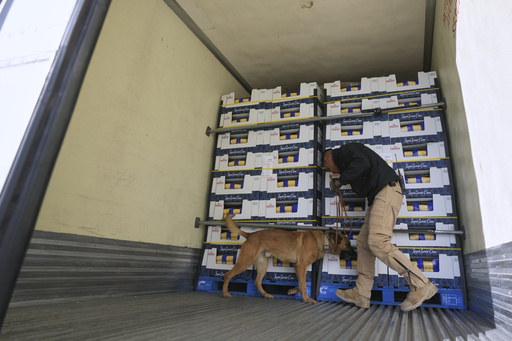
WASHINGTON — On Monday, President Donald Trump decided to delay the imposition of tariffs on imports from Mexico and Canada for a period of 30 days, following an agreement with both countries to enhance border security measures.
Previously, Trump announced that a 25% tariff would affect most imports from Mexico and Canada, along with a 10% tariff on energy products from Canada, starting at midnight on Tuesday. Both Mexico and Canada indicated they might retaliate against these proposed tariffs, increasing the risk of a potential trade conflict within the region.
In a recent statement on social media platform X, Canadian Prime Minister Justin Trudeau mentioned that he discussed additional cooperation regarding border security during a conversation with Trump. Mexico had also made similar commitments earlier on the same day.
“The planned tariffs will be suspended for at least the next 30 days while we collaborate,” Trudeau stated.
In a related development, President Trump announced that he would hold off on tariff threats directed at Mexico for a month, allowing for further dialogue after Mexican President Claudia Sheinbaum agreed to deploy 10,000 members of the national guard to tackle drug trafficking at the border.
While the tariffs against Canada and China were set to activate on Tuesday, uncertainty loomed over whether any reached agreements would hold, and whether these tariffs might signal the start of a larger trade conflict, as Trump has indicated that more import taxes are likely on the horizon.
A senior official from Canada expressed skepticism over their country’s ability to sidestep the approaching tariffs, especially since the U.S. administration appears to be changing its demands more frequently for Canada compared to Mexico. The official chose to remain anonymous due to the sensitivity of the topic.
When pressed by reporters on what Canada could offer to thwart the impending tariffs, Trump responded, “I don’t know.” He further noted that substantial tariffs against China might still be on the table: “If a deal cannot be reached with China, then the tariffs will be quite significant.”
Following their conversations, Mexican and American leaders decided to postpone the tariffs, which Trump described as the result of a “very friendly conversation.” He expressed eagerness for the upcoming negotiations.
The talks are expected to be led by Secretary of State Marco Rubio, Treasury Secretary Scott Bessent, nominee for Secretary of Commerce Howard Lutnick, along with high-ranking officials from Mexico. “I look forward to being part of these negotiations with President Sheinbaum as we work to secure an agreement between our two countries,” Trump remarked.
In advance of the negotiations, Sheinbaum detailed adjustments in border policies, and Trump confirmed the deployment of Mexican troops. Sheinbaum announced, “Mexico will enhance its northern border with 10,000 members of the National Guard, effective immediately, to combat drug trafficking into the United States, specifically fentanyl.” She further indicated that the U.S. must assist efforts to halt the flow of high-powered firearms into Mexico.
Earlier, Trump noted on social media that he engaged in a conversation with Trudeau on Monday morning and planned another discussion with him later in the day. Despite plans for both nations to impose their own tariffs in response to the U.S. measures, Mexico’s actions are currently on hold.
Trump reiterated his frustrations with Canada’s perceived lack of cooperation, highlighting a history of strong ties that dates back to World War II and the post-9/11 collaboration. “Canada doesn’t even let U.S. banks operate there,” he noted. “What’s that all about? Numerous issues persist, and it’s fundamentally a DRUG WAR, with countless American lives lost due to drugs flooding in from Canada and Mexico.”
In the financial realm, markets, businesses, and consumers are bracing for the potential impact of the new tariffs. Stock markets exhibited slight declines, indicating some relief that the anticipated import taxes, which could exacerbate inflation and disrupt global trade, may be temporary.
However, this situation underscores significant uncertainty regarding a president who has expressed admiration for tariffs, even suggesting that transitioning from tariffs to income taxes in 1913 was a mistake.
Trump remarked on Sunday that the tariffs would be lifted if Canada and Mexico took more vigorous steps to control illegal immigration and fentanyl trafficking, yet no specific guidelines were outlined. He emphasized that the U.S. cannot sustain a trade deficit with its largest trading partners.
Mexico faces a potential 25% tariff, while Canada would be subjected to a 25% tariff on most imports and a 10% tariff on its energy products. China stands to incur a 10% additional tariff due to its involvement in the fentanyl trade, according to the White House.
Kevin Hassett, the director of the White House National Economic Council, insisted that framing the situation as a trade war is misleading, despite impending retaliatory measures. “The executive order makes it clear that this is not a trade war,” Hassett asserted. “It’s a drug war.”
Even though the focus might be on curbing illegal drugs, Trump’s comments often reflect a broader sentiment that foreign nations are taking advantage of the U.S. through trade surpluses. Recently, he mentioned impending tariffs on countries within the European Union and has characterized tariffs as both a diplomatic strategy for national security and a means to renegotiate existing international trade agreements.
Many economists, independent of the administration, have cautioned that the imposition of tariffs could lead to increased prices and hinder economic growth, with Trump himself acknowledging that there may be short-term challenges following his campaign promises to address inflation.

